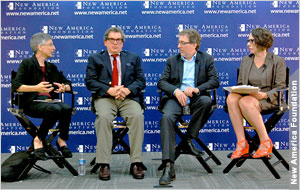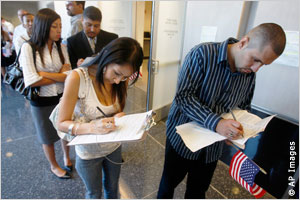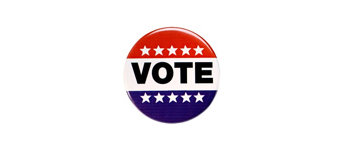Latinos' Political Power Growing, Experts Say
Latinos' Political Power Growing, Experts Say
13 July 2012

Tamar Jacoby (left), Roberto Suro (center left) and Manuel Roig-Franzia (center right) discuss the power of Latinos in American politics.

Newly naturalized citizens of Hispanic descent fill out voter registration forms at a courthouse in Las Vegas in 2008. Experts say uncertain citizenship and a large proportion of young people weaken the Latino vote.
What role will America’s growing Latino community play in the 2012 presidential election? On July 9, a group of experts gathered at the New America Foundation (NAF) to answer this question in an event called 2012 (Veinte Doce): The Latino Election?
The discussion is part of a series of talks hosted by NAF, called Delve into ’12, focusing on the 2012 presidential election. According to an event description on the NAF website, the panelists addressed three main questions: “Exactly how much political power do Latinos wield? What motivates these voters? And how might a strong Latino showing alter policymaking in Washington on November 7th and beyond?”
Speakers gave presentations and answered questions on a variety of topics about Hispanic voters and politicians. The talk included segments on the power of the Latino vote, the future influence of Hispanics on immigration reform and the impact of current U.S. Senator Marco Rubio, a Republican from Florida.
Roberto Suro, a professor of journalism at the University of Southern California, said the Hispanic vote may not affect the 2012 election, but the increasing Latino population will boost its future influence.
“The reason why we care about it is growth in numbers — the startling, very fast, very rapid growth of the Latino population. ... This is the basic, gut reason why people care about the Latino vote, just simple growth in numbers, growth at a time that the rest of the population isn’t growing very quickly,” Suro said.
Suro, a former director of the Pew Hispanic Center, presented statistics supporting his claims. He compared the diversity of different age groups in America. “If you look at the older population … that was a country that was 80 percent white. You go down in age … and you’re talking about a country that’s about half white,” Suro said. “This is a fundamental, dramatic, extraordinary change in the nature of our society and, to my mind, is as important as those numbers in explaining why the Latino vote matters.”
However, the Hispanic vote may not reach its full potential during the 2012 election, he said.
“The discussion of Latino voters is a discussion about the future of politics, not about this cycle,” Suro said. The USC professor pointed to a number of factors for this, including Latino voters’ citizenship status, geographic location and age.
“A child takes 18 years to become a voter; there’s no way around that,” Suro said. “That 50 percent America of under 5 years old will become the electorate sometime 15, 20, 25 years from now. The America that votes is quite different.”
Tamar Jacoby, a Bernard L. Schwartz fellow at NFA, agreed that it is not simply a matter of numbers when it comes to a major issue affecting Latinos: immigration law.
“My short answer is that, yes, I think the Latino vote will be important, maybe even a game changer, but it’s not going to be that simple or automatic,” Jacoby said.
Jacoby pointed to divisions in both political parties over how to deal with immigration reform. As a Republican, she acknowledged that increased polarization makes it hard for Republicans to discuss immigration.
A resolution may depend on a strong showing from Latino voters, according to Jacoby. “If Latinos do come out strong … that’s a big, powerful constituency for reform. And we haven’t had that up to now,” she said.
A portion of the event also focused on the impact of Cuban-American Senator Marco Rubio. The Latino politician is reportedly being vetted as the potential running mate for presumptive Republican presidential candidate Mitt Romney.
Panelist Manuel Roig-Franzia, a Washington Post reporter, recently published a book about Rubio’s life. The book, The Rise of Marco Rubio, uses personal contacts and public records to paint a picture of the senator’s ascension.
Roig-Franzia praised Rubio’s alternate DREAM Act immigration proposal and hinted it may have influenced President Obama’s June 15 executive order to stop the deportation of certain young immigrants who were brought to the United States as children.
“Ultimately, only President Obama and his advisers would be able to tell you whether they came up with that plan because of Marco Rubio, but it seems pretty clear that that was part of the factor,” Roig-Franzia said.
Whether in public office or the voting booth, the political influence of Latinos is projected to grow.
Overseas Voting for American Citizens
U.S. Elections 2012

New absentee voting laws are in effect for the 2012 elections. You will no longer automatically receive ballots based on a previous absentee ballot request.
All U.S. citizens outside the United States who want to vote by absentee ballot in the 2012 primary and general elections must complete a new Federal Post Card Application (FPCA) every year if they wish to vote from abroad. It's easy to do - just go to www.FVAP.gov, the official U.S. government website for overseas absentee voting information, to start the process.
More details and how to contact the Voting Officer at the U.S. Embassy London are on our Voting page.
Election Videos
-

Elections 2012: The Electoral College
The Electoral College is not a place, it's the process that takes place to election the President of the United States. The founding fathers established it in the Constitution. This video explains the process and what it is designed to achieve.
-

The General Election
The United States general election takes place on 06 November 2012. This
video sets out what happens on election day. It is part of a series of
videos from the US Embassy explaining the U.S. electoral system. -

The Road to the White House
How does the American presidential election work? This video explains the start of the process, picking the candidates. The transcript is here.
-

U.S. Elections: Conventions
The Democratic and Republican conventions will take place in America this summer. But, what exactly ARE conventions? What do they achieve? Why and when do they take place? This video tells you all you need to know. -

Caucuses Explained
What are caucuses? How do they work? Find out how
Americans pick their presidential candidates through caucuses.